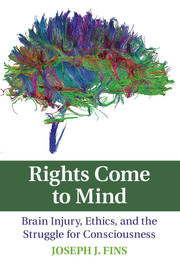Book contents
- Frontmatter
- Dedication
- Epigraph
- Contents
- Miscellaneous Frontmatter
- Acknowledgments
- Introduction
- 1 Decisions
- 2 The Injury
- 3 Coming to Terms with Brain Injury
- 4 The Origins of the Vegetative State
- 5 A Shift since Quinlan
- 6 Maggie's Wishes
- 7 Something Happened in Arkansas
- 8 From PVS to MCS
- 9 Leaving the Hospital
- 10 Heather's Story
- 11 Neuroimaging and Neuroscience in the Public Mind
- 12 Contractures and Contradictions: Medical Necessity and the Injured Brain
- 13 Minds, Monuments, and Moments
- 14 Heads and Hearts, Toil and Tears
- 15 What Do Families Want?
- 16 Deep Brain Stimulation in MCS
- 17 Mending Our Brains, Minding Our Ethics
- 18 It's Still Freedom
- 19 Maggie Is in Town
- 20 When Consciousness Becomes Prosthetic
- 21 The Rights of Mind
- 22 A Call for Advocacy
- Epilogue
- Notes
- In Memoriam
- Index
16 - Deep Brain Stimulation in MCS
Published online by Cambridge University Press: 05 September 2015
- Frontmatter
- Dedication
- Epigraph
- Contents
- Miscellaneous Frontmatter
- Acknowledgments
- Introduction
- 1 Decisions
- 2 The Injury
- 3 Coming to Terms with Brain Injury
- 4 The Origins of the Vegetative State
- 5 A Shift since Quinlan
- 6 Maggie's Wishes
- 7 Something Happened in Arkansas
- 8 From PVS to MCS
- 9 Leaving the Hospital
- 10 Heather's Story
- 11 Neuroimaging and Neuroscience in the Public Mind
- 12 Contractures and Contradictions: Medical Necessity and the Injured Brain
- 13 Minds, Monuments, and Moments
- 14 Heads and Hearts, Toil and Tears
- 15 What Do Families Want?
- 16 Deep Brain Stimulation in MCS
- 17 Mending Our Brains, Minding Our Ethics
- 18 It's Still Freedom
- 19 Maggie Is in Town
- 20 When Consciousness Becomes Prosthetic
- 21 The Rights of Mind
- 22 A Call for Advocacy
- Epilogue
- Notes
- In Memoriam
- Index
Summary
Assaulted
According to his mother, Corinth Pecco, Greg was a sharp dresser who liked nice things and always had a good job. He had a number of girlfriends and was a sweet guy. He never got into trouble and did not like to fight. But that, unfortunately, made him “an easy catch” for local hoodlums who viciously attacked him. Greg, whose nickname was Freedom, was thirty-eight, unmarried, and with a young daughter when he was assaulted.
As his mother told us, his attackers “got high and they went out and riding around and they saw Freedom and they know what type of person he is.” And she continues with resignation, “They knew he wasn't going to fight.”
When Corinth arrived at the hospital, Greg's father told her how badly their son was beaten. “His brain was smashed in” and he was not expected to live. The situation was so bad that it was initially thought he was brain dead when he arrived in the emergency room of a local hospital. According to Corinth, “… they said, ‘DOA.’ That he was like dead … brain dead.”
It took her aback because she hadn't imagined Greg's injury was serious. She remembers that when she first got the call from the hospital, everything “was going well, I mean nothing like this happened before this happened, so I paid it no mind. Believe it or not … I got my nails done. I went to the hairdresser and got my hair done. Then [I thought] I'll stop by the hospital ‘cause Greg has never been in any problem, never had any problems with him, so you wouldn't think of anything.”
The medical record confirms his dire condition. The assault had resulted in a closed head injury to the right frontal lobe, which caused bilateral subdural hematomas, or blood collections. These collections, in turn, caused increased pressure within the brain and significant degrees of herniation, the actual expulsion of the brain out of the skull through its large opening at its base where the spinal cord connects to the brain. He had lost his light reflex in his right pupil, a sign that he had herniated and his status was grim, just above brain death.
- Type
- Chapter
- Information
- Rights Come to MindBrain Injury, Ethics, and the Struggle for Consciousness, pp. 204 - 215Publisher: Cambridge University PressPrint publication year: 2015



